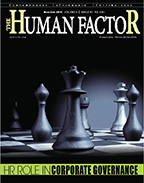COVER STORY The Organisational DNA The Structure of Ethics Despite myriad challenges, companies are proactively combating fraud and developing a culture of ethics at workplace Issue Date - 01/03/2013 |
 Business ethics are of paramount importance in the present scenario, as many top organisations continue to be marred by umpteen scandals and frauds. It is an incontrovertible and firm commitment to ethical behaviour and practice that ultimately translate into organisational success. Business ethics are of paramount importance in the present scenario, as many top organisations continue to be marred by umpteen scandals and frauds. It is an incontrovertible and firm commitment to ethical behaviour and practice that ultimately translate into organisational success. Corporate frauds and bungling have wide-ranging implications. Business suffers in terms of reputation, value and market capitalisation. It is alarmingly prevalent across countries, and across sectors of the economy. In the last few decades, with the advent of sophisticated technological tools, corporate frauds have assumed terrifying proportions worldwide. From petty employee frauds to big financial scandals, organisations are battling with this menace on many fronts. In India, corporate frauds have a long, chequered history. Ethics have been a grey area in Indian companies for decades. According to a case study by IBSCDC, corporate fraud is a major area of concern with almost 42 per cent the companies experiencing it, incurring a direct loss of $1.5 million. The suppliers’ kickback, it says, is the most prevalent form of fraud. Companies have put in place a slew of measures - employee registry, biometric identification, background check - to deal with the scourge of corporate frauds. However, a pertinent question is: why are corporates still struggling to combat fraud when there are ample measures in place? Are these measures not amply comprehensible and adequate to rid the system of this menace? The alarming trend and the denial Over the years, as the competition has got fierce, the organisational structure has become increasingly decentralised, leading to weak internal control within organisations. It has in turn spurred the incidence of big and small corporate frauds. There is a growing feeling that early detection is critical in combating this menace. According to PWC survey, 99 per cent of the respondents have incorporated internal controls, internal and external audits, compliance programmes and code of ethics to control fraud. Corporate frauds in India have witnessed a sharp climb in past two years, and ironically enough, companies consider it inevitable. This trend, according to a global consultancy firm KPMG’s biennial, ‘India Fraud Survey 2012’ is ‘dangerous’ as it forces organisations to exhibit a tolerant approach towards the cases of fraud. “Close to 55 per cent of respondents indicated that their organisations experienced fraud in the last two years vis-a-vis 45 per cent in 2010 edition of our survey,” the report said. In March 2012, Ernest & Young (E&Y) carried out its first survey of corporate fraud in India, titled ‘Fraud and Corporate Governance: Changing Paradigm in India’. The survey highlighted the callousness of top leadership in Indian companies and their willingness to sweep things under the carpet. Only 35 per cent of respondents said their employers take legal action against fraudsters. “Companies typically prefer to avoid reporting any economic offence to a regulator because of a perceived threat to their reputation,” concluded the survey report. |
 Big corporate frauds in India and abroad Big corporate frauds in India and abroadIn 2009, New York-listed Satyam shocked the corporate world with a startling disclosure. The company’s profits had been incorrectly exaggerated for years. About 94 per cent of the cash presented on papers was fabricated, as confessed by the company CEO Ramalinga Raju. The fraud was undetected due to the brazen manipulation of funds. The Satyam scandal opened a new chapter in the history of corporate frauds in India. Earlier, Daewoo Motors India Ltd. was referred to Serious Fraud Investigation Office (SFIO) in 2003 on the charges of financial irregularities amounting to over 1000 crore. The findings of internal corruption probe forced Walmart to take a re-look at its India operations. Reebok India alleged the fraud of Rs 870 by a senior supervisor in September 2012. Outside India, the corporate frauds and embezzlements have been even bigger. A former Chairman of Nasdaq stock exchange had to face the embarrassment when FBI arrested him and frozed his assets in December 2008 on securities fraud charges after his $50 billion Ponzi scam was exposed. A former Tyco CEO was convicted in 2005 of siphoning more than $400 million from company funds, and sentenced to eight years term in jail. Co-founder and former CEO of WorldCom was convicted of fraud and conspiracy in the largest accounting scandal in the US history in 2005. Chief Financial Officer of Targus Group International was impeached in 2001 on over two dozen counts of fraud, laundering, and conspiring. Director of Smith Technologies was arrested in connection with a big income tax fraud in 2001, resulting in a five month prison term. Former head of a US based company Computer Associates International was sentenced to 12 years in jail in 2006 after being charged with serious fraud related to securities and obstruction of justice following a lengthy period of investigation into the case. Initiatives by GOI to check fraud Despite the myriad challenges, Government of India has been proactively dealing with the scourge of corporate frauds. In December 2012, the Corporate Affairs Minister Sachin Pilot said the ‘cosy’ relations between management and auditors of a company more often than not lead to cases of fraud. This was perceived as a veiled warning and a wake-up call for corporate honchos in the country. To combat the corporate frauds, the government has committed to establish National Financial Reporting Authority (NFRA), a quasi-judicial body that would look after the quality of audits and check the discrepancies, if any. At an ICAI annual function last week, Pilot said there is no going back on this proposal that seeks to bring in work transparency. The proposal to set up NFRA is part of the Companies Bill, 2012, which has already got an approval from Lok Sabha. |



